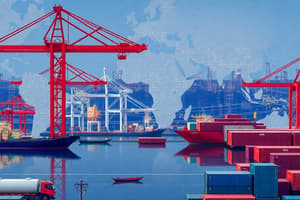Podcast
Questions and Answers
What is the primary focus of classical political economy?
What is the primary focus of classical political economy?
- The critique of capitalism through class struggle
- The role of institutions in economic performance
- The function of markets and the concept of the 'invisible hand' (correct)
- The importance of government intervention in markets
Which of the following best describes the focus of Marxist political economy?
Which of the following best describes the focus of Marxist political economy?
- The analysis of various market systems and their political implications
- The significance of class struggle in the critique of capitalism (correct)
- The examination of globalization's effect on local economies
- The interdependence between political forces and economic policies
What does the concept of interdependence in political economy refer to?
What does the concept of interdependence in political economy refer to?
- The mutual influence between political forces and economic conditions (correct)
- The singular focus on government policies without considering markets
- The exclusivity of economic systems in shaping political structures
- The independence of economic activities from political actions
How does the state role contribute to economic activity according to political economy?
How does the state role contribute to economic activity according to political economy?
What aspect does globalization examine in the context of political economy?
What aspect does globalization examine in the context of political economy?
What methodology involves the use of data and statistical methods in political economy?
What methodology involves the use of data and statistical methods in political economy?
In the analysis of policy outcomes, what key component involves how resources are allocated?
In the analysis of policy outcomes, what key component involves how resources are allocated?
What are the implications of economic inequality in political economy?
What are the implications of economic inequality in political economy?
Flashcards are hidden until you start studying
Study Notes
Political Economy
-
Definition: The study of how political forces influence economic policies and outcomes, and how economic conditions affect political structures and behaviors.
-
Key Concepts:
- Interdependence: Examines the relationship between politics and economics, highlighting how they shape each other.
- State Role: Considers how government intervention, regulation, and policies impact economic activities.
- Market Systems: Analyzes different economic systems (capitalism, socialism, mixed economies) and their political implications.
-
Theories:
- Classical Political Economy: Focuses on the role of markets and the idea of the "invisible hand" (Adam Smith).
- Marxist Political Economy: Emphasizes class struggle and the critique of capitalism (Karl Marx).
- Institutionalism: Highlights the importance of institutions in shaping economic performance and political outcomes.
-
Key Components:
- Production: How resources are allocated and managed within an economy.
- Distribution: The way wealth and resources are spread among individuals and groups.
- Consumption: The patterns and behaviors of consumers in the economic system.
-
Globalization:
- Examines how global interconnections affect local economies and political systems.
- Issues include trade policies, multinational corporations, and international regulations.
-
Policy Analysis:
- Evaluates the impact of economic policies (taxation, welfare, trade) on society.
- Considers the political motivations behind economic decisions.
-
Contemporary Issues:
- Economic inequality and its political implications.
- The influence of lobbying and special interest groups on policy-making.
- The relationship between economic crises and political instability.
-
Methodologies:
- Quantitative analysis: Uses data and statistical methods to assess economic and political phenomena.
- Qualitative analysis: Employs case studies and interviews to understand the complexities of political economy.
-
Interdisciplinary Approach:
- Combines insights from economics, political science, sociology, and history to provide a comprehensive understanding of political economy.
Political Economy Overview
- Study of the interplay between political forces and economic policies, exploring mutual influences on outcomes and structures.
- Investigates the impact of economic conditions on political behaviors and institutions.
Key Concepts
- Interdependence: The reciprocal relationship between political and economic systems, demonstrating how they shape one another.
- State Role: Analyzes government intervention, regulation, and policy-making and their effects on economic activities.
- Market Systems: Examines various economic frameworks such as capitalism, socialism, and mixed economies, assessing their political consequences.
Theories of Political Economy
- Classical Political Economy: Advocates for the significance of free markets and the "invisible hand" theory proposed by Adam Smith.
- Marxist Political Economy: Centers on class struggle and critiques capitalism through the lens of Karl Marx's theories.
- Institutionalism: Stresses the role of institutions in shaping economic outcomes and influencing political processes.
Key Components
- Production: Focuses on resource allocation and management within economic systems.
- Distribution: Explores the dissemination of wealth and resources among various societal groups.
- Consumption: Analyzes consumer behavior and spending patterns within the economy.
Globalization
- Investigates the impact of global connections on local economies and political frameworks.
- Addresses issues such as trade policies, the role of multinational corporations, and international regulatory frameworks.
Policy Analysis
- Assesses the societal impact of economic policies including taxation, welfare, and trade.
- Evaluates the political motivations behind economic decisions and their implications for society.
Contemporary Issues
- Highlights economic inequality and its ramifications for political dynamics and power distributions.
- Discusses the role of lobbying and special interest groups in influencing public policy-making.
- Explores the relationship between economic crises and political instability, examining causative links.
Methodologies
- Quantitative Analysis: Utilizes data and statistical tools to analyze economic and political phenomena.
- Qualitative Analysis: Employs case studies and interviews to delve into the nuanced complexities of political economy.
Interdisciplinary Approach
- Integrates perspectives from economics, political science, sociology, and history for a holistic view of political economy.
Studying That Suits You
Use AI to generate personalized quizzes and flashcards to suit your learning preferences.




